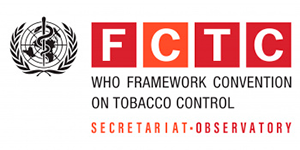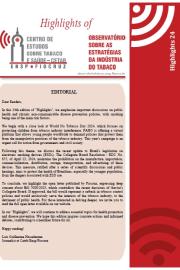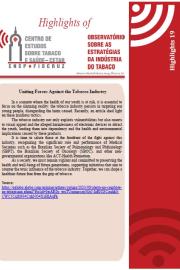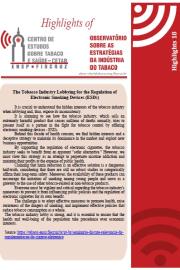
'''Smoking kills – yet the tobacco industry applies a series of tactics and tricks to manipulate public opinion. They invest in socio-environmental programs, make donations to hospitals and city halls, offer crumbs using the discourse of relieving populations immersed in natural disasters. All this to take away the focus on its lethal products and to gain an aura of respectability.
Public opinion governs the functioning of societies and the tobacco industry devotes considerable resources to trying to corrupt it. The industry is aware that the vision of millions of people every day is influenced by the mass media. It hires public relations firms and other groups to invent and distort the news in order to promote its lethal business. Public relations firms are often used in an attempt to manipulate the media and public opinion about various aspects of tobacco control and to gain support from people who oppose government 'intrusion' in business and taxation, instigating thus anti-regulatory and anti-government overviews.
However, the main way to manipulate public opinion is through "Corporate Social Responsibility" (CSR), also known as "social investment". While CSR activities in many sectors reflect an honest commitment to ethical behavior and contribution to economic development, while improving the quality of life for employees, the local community and society as a whole, for the tobacco industry it is a strategic that works in its own favour. The tobacco industry's CSR activities can include ineffective teen smoking prevention campaigns, which allow the industry to present itself as 'caring' for young people, to whom it also sells its lethal products. The industry works hard to support social programs aimed at tobacco farmers and their children, as well as unusual social causes in relation to their core business, such as programs to combat domestic violence against women, humanitarian relief efforts and environmental causes and groups. .
Often, a group accepts funds from or works with the tobacco industry, and the industry thus regains some of the respectability it has lost through the social, economic, environmental and health damage caused by its products. In short, the tobacco industry uses CSR to claim that it cares about society and the environment, and also to present itself as a responsible member of society.
These CSR efforts interfere with health policy by winning the goodwill of politicians and the public for the industry. The industry uses CSR to attract non-tobacco groups – sometimes not even health-related ones – to become their allies. In this way, when there are attempts to regulate tobacco advertising, for example, the industry can mobilize a group of companies allied with, or in debt to, to speak in its favor.
This phenomenon has recently been seen in countries from regions as diverse as Africa. 1 and Europe 2,
where tobacco company representatives complained that a proposed ban on sponsorship, a recognized form of marketing, was harmful and unnecessary. A chorus of protests from charitable organizations that support causes such as mental health and care for the elderly were quoted in the media and presented as opposition to proposed legislation banning tobacco advertisements. Media reports focused on the charities' loss of income rather than the health gains that would come from curbing tobacco advertisements.
In this regard, read also:
* CSR tactics
* Media tactics
* Advertising and marketing tactics
* Online tactics
* Educational tactics
- 1. ANTI-Smoking laws blocking firms from charity. Tobacco.org, Estados Unidos, 2 mar. 2009. Disponível em: http://archive.tobacco.org/news/279518.html. Acesso em: 18 nov. 2014. Documento integral em PDF: https://drive.google.com/file/d/0B0HvJttn0WXDY1k1UEZ4S2FRSm8/view?usp=sh....
- 2. Amos, H. Foreign tobacco faces ban on charitable donations. Moscow Times, 14 dez. 2011. Disponível em [http://www.themoscowtimes.com/news/article/foreign-tobacco-faces-ban-on-... http://www.themoscowtimes.com/news/article/foreign-tobacco-faces-ban-on-.... Acesso em: 18 nov. 2014. Documento Integral em PDF: https://drive.google.com/file/d/0B0HvJttn0WXDZ1p5UlFQblFNZk0/view?usp=sh....




